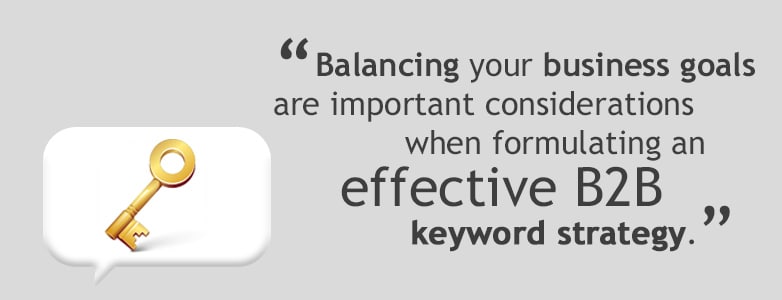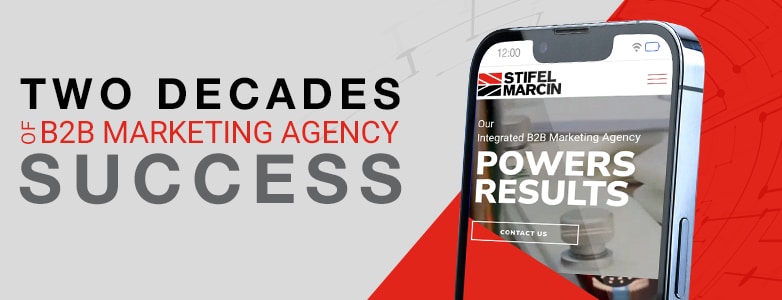Effective B2B keyword research helps marketers determine which “key words”, or best phrases, can be used to help you meet your marketing goals. Careful research, strategic thinking and data-driven analysis can help hone your PPC placements – and therefore your spend – to be sure your ads are in the right place with the right presentation. While keywords might seem obvious, our clients are often surprised by the results. What many companies use internally as standard terminology are often unknown to customers.
From descriptive statements, to application-specific “long-tail keywords” (see terms below) to generic terms related to a product category, knowing where to place and how to bid effectively, are critical for success.
Some media will present PPC advertising like a quick and easy way to increase your leads. Google even offers recommendations and tips on how to run your campaigns. But remember, Google is a for-profit company driven by revenue… their tips are not necessarily designed to maximize your ROI (return on investment). And more importantly, they are not offered with a detailed understanding of your products and services – which is vitally important when working in a B2B space.
Here are a few keyword research tips so you can maximize your targeting to improve click-throughs and ROI. Of course, the best approach is an expert approach, and our Google Certified team is always ready to help your company in its digital and PPC marketing, with our expertise in manufacturing, industry, medical and technology verticals.

Data-Driven. Human-Focused
A plan for B2B keyword research involves analysis and interpretation – combing data with input from your sales team to identify the words and phrases that will lead customers to your site and your products/services. We want to build a bridge between your keywords – a search query typed into a search engine – and the content you have on your website. Effective B2B keyword research is not just about getting visitors to your site. It’s about getting the right visitors to your site, those who match your target customer, meet your marketing goals, and are the most likely to make a purchase.
Let’s assume your marketing team already has the right input from sales and leadership and is clear on your company’s target audience and business goals. The first step is to brainstorm an extensive list of potential terms to target. Next, we use that list to determine important data points that can help us identify which B2B keyword targets will work best. We look at information like:
- Search traffic – how many people are searching for each phrase (which can even be focused within a certain geographic area).
- Competition – how many organizations are also targeting that term. Typically, the more competition, the more expensive the bid.
- Specificity – how accurate is this term for your target goals? For example, “marketing agency” is going to provide a much broader array of results than “industrial B2B marketing agency.”
- Relevancy – how accurate is this term for your target goals? While a term may get people to your site, identifying which terms are more likely to convert to leads is needed.
- Budget – while it may seem odd to include budget in our B2B keyword research data, this is critical to evaluate if a term should be included. If one keyword is going to use an entire daily budget with just one click, it may not be worth including. Determining bid and budget in the initial data phase can help save time in the long run.
Keyword Expansion and Refinement
Now that you have key data points, we want to expand and evaluate. If some terms are too broad (or too expensive), look deeper at the opportunities. Are more specific phrases available with good search traffic volumes? Are some keywords showing lots of search traffic and relevancy, and we should explore similar phases, synonyms, etc.?
One effective strategy to help determine keyword viability is to simply conduct a Google search – see the results that appear and be sure what you expected to appear is what is displayed – and appropriate for your marketing goals. If more than 50 percent of search results are not relevant – especially when using a long-tail B2B keyword phrase – this should be a signal. Either you have identified a great opportunity, or you are not using the right phrase. The more irrelevant the expected search results are, the more likely the target that you want is going to change their search query and re-check a new phrase.
Getting a final keyword target list is time-consuming. It takes evaluation, review, additional research and discussion.
Balancing the Right Types of B2B Keywords
When evaluating your B2B keyword list, you want to be sure you have included a variety of terms. While highly-focused, long-tail keyword phrases probably are very specific, very relevant and will use your budget effectively (due to low bid estimates), you may have an extensive campaign with very little traffic.
Balancing short, medium and long-tail B2B keywords can help you get good quality clicks, but also increase your website traffic. If you maintain positions in the preferred top-three search results, sometimes a simpler phrase will serve your ad to a customer who is just starting on their buying journey – you will be first to capture their click, and then can drive them into your sales funnel.

When evaluating your B2B keyword mix, one should consider these keyword types:
Short-Tail Phrases: Usually consisting of one or two words, and are the broadest keywords, typically with the highest search volumes. These terms can be useful for brand recognition or to increase clicks to your site, but it is sometimes difficult to discern these users’ intentions. These short terms typically have a higher bounce rate (people who only view one page of a website) or may be people who are early in their purchase journey and not ready to convert to a lead. A small selection of these terms can be useful when building out a new campaign, or when your marketing goal is to increase the number of clicks. Actively reviewing these terms is very important and can also provide other relevant data.
Medium-Tail Phrases: These are keywords that typically utilize three or four words. While more specific than short-tail phrases, they will also have lower search volumes. Often these users have a clearer sense of what they’re seeking. This makes it easier to optimize your ad content, connect with the consumer, and direct them to the right content on your website. Additionally, if one manually reviews the full scope of search queries, marketers can often find new keyword opportunities.
Long-Tail Phrases: Usually a long-tail phrase consists of four or more words and are highly-specific, tend to have the lowest search volume and low competition levels. Statistically, these keywords usually result in higher-quality leads because they capture people later in the sales process and/or are highly-qualified, and potentially ready to convert.
Balancing your business goals – brand visibility, increasing site visitors, promoting specific products/services and increasing qualified leads – are all important considerations when formulating an effective B2B keyword strategy.
PPC Terms and Website Content Relevancy
It’s important to evaluate your website content when determining target phrases. In Google Ads, your bid costs and result position are not just determined by traffic volumes, budget and competition, but also how relevant your website is to your search term. Google understands that users do not have the patience for bad search results – they want to click on an ad and get to the information they are searching for.
It’s important to know which questions your audience is likely to be asking to present yourself as a business with answers. If you can get your B2B keywords to more closely match your customer’s search queries, and drive them to content that fulfills their expectations, you’ll be rewarded with high-quality leads and superior conversion rates.
Content relevancy also will affect the selecting of keywords for your campaign. Website pages must logically relate to the user’s search term or you will be penalized with higher costs and frustrated users, who are clicking and not getting the information they expect. Simply because the sales teams want to pursue a specific keyword, is not reason enough to target it, or the budget utilized on those phrases may have little return.
Remember, with Google’s advanced algorithms, the search engine can associate closely-related terms and phrases. While this can also negatively affect campaigns – specifically B2B campaigns – this should be considered when helping to evaluate landing pages and content development needs.
A good PPC strategy goes hand-in-hand with good content marketing. Data-driven keyword research, performance analysis, and content expansion can yield great results – letting you target new and expanding search terms with highly-specific information.
A Critical Keyword Research Tip – Your Work Doesn’t Stop at Launch
It’s critical to actively manage any digital campaign after launch. The best plan may not perform as expected when launched – even one phrase that is too broad can dramatically affect performance. Extensive performance reviews that occur during the first days/weeks after launch will provide key metrics that should affect how the campaign is configured. Continually reviewing, adjusting and maintaining the campaign will ensure long-term performance and that every keyword has the budget and bid it needs to deliver results.
PPC and digital advertising doesn’t stop at launch. Campaigns that are not maintained can lead to unnecessary spend and results that don’t match business goals.
Strategic B2B Marketing Planning and Evaluation
A smart, strategic digital and PPC marketing campaign encompasses many areas. Marketers must be aware of sales goals, business objectives, campaign positioning, brand benefits, and effectively manage a budget. It also ties with a complete campaign strategy – using available budgets and capitalizing on other marketing initiatives – such as content marketing – to improve results.
One very important step that many B2B companies skip over is the evaluation of a Cost Per Lead. Some will look at a bid price, or a monthly bid spend and (understandably) get concerned when they see a campaign that is converting 1-2% of clicks into leads. But the missing piece here is the value of that lead. Determining how many leads convert to a sale – then actually what the long-term value of a lead is critical.

We understand this can be difficult to calculate. While the first ROI may be easy to determine, if we know the estimated lifetime value of a customer, we can more easily identify the return. Additionally, if we average all leads/sales totals this will also affect the short-term and long-term ROI.
In a highly-specific market, when the long-term value of one new lead is high, it’s important to identify that value. Often budgets are reviewed with short-term considerations, resulting in tactics poorly affecting long-term results.
Finally, a good marketing strategy also looks at resources – not only financial resources (i.e. your campaign budget or spend), but also human resources. If your PPC marketing is generating leads and reducing cold-calling or manual lead generation efforts for your sales team – leaving them free to nurture customers, etc. – there is added value.
While Stifel Marcin has more than two decades of results in effective PPC campaigns, the best results occur when we have a collaborative transparency in the return analysis process. True results can be gauged, and a campaign refined to improve outcomes, when we can understand the value from our customer’s perspective. It’s truly a value that is specific to a company, and while we can apply best practices based on our B2B-focused digital marketing expertise, knowing the actual numbers will yield even better results.
Google Ads Certified Advertising for B2B Clients
As a Google Partner Agency focused on business-to-business clients, our Certified Team works closely with companies in the manufacturing, industrial, and technology sectors. With a special focus on PPC, SEO and SEM for the B2B industry, our team works to ensure that marketing goals are reached. It takes careful data analysis, expertise in search engine marketing and a thorough understanding of your unique products/services, target audience and goals before we identify the best B2B keywords to target and utilize that list to deploy a full strategy.
A good PPC campaign should be part of a complete marketing campaign – and understanding how paid search engine marketing fits into your total strategic mix – to evaluate, deploy and determine results.
Thinking about trying PPC advertising as part of your marketing? Complete our form and we will contact you. We’re happy to discuss your needs and goals – contact us to discover how we can help your organization Power Up Your Marketing.

Stifel Marcin – The B2B Marketing Agency
Unlike many advertising and marketing agencies, B2B isn’t just something that we do, it’s all we do. We’ll work to help your brand achieve its goals through the strategic combination of creativity, communication and technology. Our focused client intake processes give us the ability to thoroughly understand your business, products and objectives, working to identify the competitive advantages and opportunities that will grow awareness, leads and sales. We develop innovative marketing plans with strategic, data-driven processes, presenting complex ideas and compelling messages that position your business ahead of the competition. As your cooperative partner, our integrated B2B marketing agency is dedicated to your success. If you have questions about how PPC, SEO, and SEM can work for your company, we’re here to help. Reach out today.




